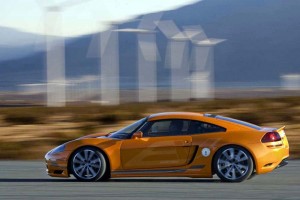
Chrysler is shutting down its ENVI battery car unit, though the maker insists it will "absorb" the project into its conventional sales divisions.
Despite taking more than eight hours to brief the news media on its plans for the future, Chrysler and its new masters, Fiat, left some gaping holes, last week – notable among them, the company’s intentions, post-bankruptcy, for electric vehicles.
Now, it seems, that question has been answered, Chrysler is eliminating its ENVI electric vehicle unit, though well-placed company sources tells TheDetroitBureau.com that despite some news reports, this morning, it is not eliminating battery car development.
Quite the contrary. The U.S. maker will become the “center of excellence” for all electric vehicle development for both its own product programs and those of its Italian parent, Fiat.
ENVI will be “absorbed” by the various Chrysler divisions, suggested spokesman Nick Capa, the only comment any source would make on the record, but privately, company insiders bristled at headlines suggesting battery vehicle development is being eliminated at Chrysler. Perhaps, but during last week’s presentation, CEO Sergio Marchionne made it clear he does not see high-volume demand for electric vehicles, at least not during the automaker’s new five-year plan.
Any decision to abandon ENVI or simply cut back on battery car development could ruffle some feathers, and not just among environmentalists, as Chrysler had pointed to the unit, and its potential to reduce emissions and curb oil consumption, in its bid for a $12.5 billion federal bailout.
Lagging its competitors in the development of advanced propulsion systems, Chrysler’s former owners, Cerberus Capital Management, set up ENVI as a way to rush battery-based products to market. In mid-2008, Chrysler’s former Chairman Bob Nardelli unveiled three possible offerings, including a battery version of the company’s minivans, a hybrid Jeep and a battery-electric Dodge sports car developed, in part, with the British engineering firm, Lotus.
In May of this year, Chrysler submitted an application for $448 million in government aid to help develop battery technology, and in August, it received a $70 million grant from the U.S. Department of Energy to develop a fleet of 220 hybrid minivans and pickups. Separate sources said that pilot project will continue.
But what’s far less certain is a target the troubled U.S. maker set for itself during last January’s North American International Auto Show, in Detroit. It pledged to put 500,000 battery vehicles on the road by 2013, a goal few critics found believable, though the promise did include more conventional hybrid-electric models.
Chrysler’s initial HEV offerings, including a version of the full-sized Aspen SUV, failed to develop any significant demand and were quickly pulled from the market, leaving the company, now, the only major automaker without a hybrid in its line-up.
One insider described the latest move as a “natural progression” in the move to bring electrified products into the mainstream. According to Reuters, the former head of ENVI, Lou Rhodes, has been delegated by Chrysler’s new CEO Sergio Marchionne, to become head of electric vehicle development for both Chrysler and Fiat.
But mainstreaming battery cars will likely come slowly, at least from the viewpoint of Marchionne. While he notably avoided discussing the ENVI operation, last week, the Canadian-educated executive did offer a rather skeptical response when asked how much of a market he foresaw for battery vehicles. Marchionne predicted that by the end of the company’s new 5-year plan, they would make up just “one or two percent” of sales. And even though the company hopes to more than double total volume, by 2014, to 2.8 million worldwide, that would mean just 28,000 to 56,000 hybrids and other battery vehicles.
“Until the (issue of battery) storage gets resolved, I think electric vehicles are going to struggle,” Marchionne cautioned.
Some observers believe that Fiat and Chrysler may, going forward, put more of an emphasis on using battery power on the small to medium-sized vehicles that will be developed in Italy, such as the Fiat 500 minicar. Providing acceptable range and performance would be easier in such vehicles and a lot less expensive, since it would require significantly fewer batteries than in a big Jeep, minivan or pickup.

